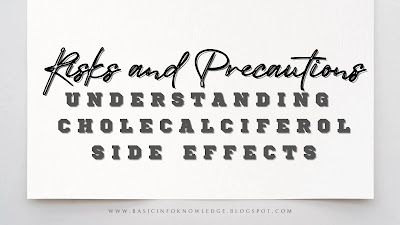Understanding Cholecalciferol Side Effects: Risks and Precautions
 |
| Cholecalciferol Side Effects |
Introduction
- A brief overview of cholecalciferol and its benefits
- Mention of potential side effects
- Section 1: What is Cholecalciferol?
Definition and explanation of cholecalciferol
- How it is produced in the body
- Sources of cholecalciferol in food and supplements
- Section 2: Benefits of Cholecalciferol
Role in calcium and phosphorus absorption
- Effects on bone health
- Potential benefits for immune function
- Section 3: Cholecalciferol Side Effects
Overview of potential side effects
- Mild side effects such as nausea and constipation
- More serious side effects such as hypercalcemia and kidney damage
- Section 4: Risk Factors for Cholecalciferol Side Effects
Factors that increase the risk of experiencing side effects
- Age, health status, and medication use
- Safe dosage levels and recommended intake
- Section 5: Precautions for Using Cholecalciferol
Importance of consulting with a healthcare provider before taking cholecalciferol supplements
- Recommended dosage levels and frequency of use
- Monitoring for potential side effects and seeking medical attention if necessary
- Section 6: Conclusion
Summary of key points
Importance of being aware of potential cholecalciferol side effects and taking precautions when using supplements.
Introduction
Cholecalciferol, also known as vitamin D3, is a vital nutrient for maintaining healthy bones, teeth, and immune function. While it is generally considered safe, it is important to be aware of the potential side effects and take precautions when using supplements. In this article, we will explore cholecalciferol in more detail, including its benefits, risks, and precautions.
Section 1: What is Cholecalciferol?
Cholecalciferol is a form of vitamin D that is produced naturally in the skin when it is exposed to sunlight. It can also be obtained from certain foods, including fatty fish, egg yolks, and fortified foods such as milk and cereal. Cholecalciferol is also available in supplement form, often combined with other vitamins and minerals.
Section 2: Benefits of Cholecalciferol
Cholecalciferol plays a crucial role in calcium and phosphorus absorption, which is essential for maintaining strong bones and teeth. It also supports the immune system, helping to fight off infections and diseases. Some research suggests that cholecalciferol may also have a protective effect against certain types of cancer and other chronic diseases.
Section 3: Cholecalciferol Side Effects
While cholecalciferol is generally considered safe, there are some potential side effects to be aware of. Mild side effects may include nausea, constipation, and diarrhea. More serious side effects can occur if excessive amounts of cholecalciferol are consumed, including hypercalcemia (high levels of calcium in the blood), which can lead to kidney damage, heart problems, and other health issues.
Section 4: Risk Factors for Cholecalciferol Side Effects
Several factors can increase the risk of experiencing cholecalciferol side effects, including age, health status, and medication use. Older adults, those with kidney disease, and individuals taking certain medications such as steroids may be more susceptible to side effects. Safe dosage levels and recommended intake will vary depending on individual health status, age, and other factors.
Section 5: Precautions for Using Cholecalciferol
It is important to consult with a healthcare provider before taking cholecalciferol supplements, particularly if you have an existing health condition or are taking medication. Recommended dosage levels and frequency of use will vary depending on individual needs, and monitoring for potential side effects is important. It is also recommended to choose high-quality supplements from reputable sources and to follow the instructions carefully.
Section 6: Conclusion
In conclusion, cholecalciferol is an important nutrient for maintaining healthy bones, teeth, and immune function. While it is generally considered safe, it is important to be aware of potential side effects and to take precautions when using supplements. By consulting with a healthcare provider, following recommended dosage levels, and monitoring for potential side effects, individuals can safely enjoy the benefits of cholecalciferol supplementation.
Additionally, it is important to note that some individuals may be able to obtain sufficient levels of cholecalciferol through sunlight and a well-balanced diet. However, this may not be the case for everyone, particularly those who live in areas with limited sunlight or who have dietary restrictions.
It is also worth mentioning that cholecalciferol supplements are not recommended for everyone. For example, individuals with hypercalcemia or certain medical conditions may need to avoid vitamin D supplements altogether or only take them under the supervision of a healthcare provider.
Overall, understanding the risks and precautions associated with cholecalciferol supplements is essential for anyone considering their use. By doing so, individuals can make informed decisions about whether or not to take these supplements and how to do so safely and effectively.

0 Comments